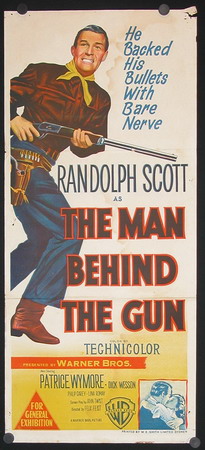
THE MAN BEHIND THE GUN
US, 1953, 82 minutes, Colour.
Randolph Scott, Patrice Wymore, Dick Wesson, Philip Carey, Lina Romay, Roy Roberts, Morris Ankram, Alan Hale Jr.
Directed by Felix E. Feist.
The Man Behind the Gun is a routine Randolph Scott western, just before he made the series of famous westerns with director Budd Boetticher.
Scott, rather at ease, plays an American army major in the years before the Civil War. There is a movement for southern California to secede from California and the government in Sacramento and become a new state, with slavery. There is a mystery about who is leading this movement, whether it be a wealthy man, Creegan (Morris Ankram) or whether the local military commander (Philip Carey) is in league with the group. However, there seems to be a murder – but a revelation that the local senator, seemingly a hero, is behind the conspiracy.
Scott comes in undercover but has to reveal himself as a major. He has two former soldiers as his henchmen, having them on parole and signing up again to serve with him, played by Dick Wesson and Alan Hale Jr. The romantic interest is a strong-minded teacher, Lora Roberts, played by Errol Flynn’s wife, Patrice Wymore who made a number of films at Warner Bros at this time.
The direction is by Felix E. Feist, director of a number of B films and small-budget features.
1.The popularity of Randolph Scott? His focus on westerns? This film as one of his 50s westerns? Original? Conventional?
2.The western settings, California, pre-Civil War, Los Angeles and its beginnings? The musical score?
3.The background of the era, southern California and the possibility of secession from California? To become a slave state? Revolution and uprising? Politicians, the army?
4.The introduction to Major Callicut, the shootings at the beginning? His being quick on the draw? His work with Olaf and Monk? Undercover? Travelling to Los Angeles?
5.The stagecoach, his cover? Seeming meek? The discussions about secession, about guns? The holdup, Callicut’s shrewdness and his forestalling the attack? The encounter with Joaquin Murietta and letting him go, later using him? Creegan and his talk about secession? The senator and his benign approach? Lora and her being quick with the gun? The teacher?
6.Los Angeles, Captain Giles in charge? The issue whether he was in league with the secessionists or not? His love for Lora? His past relationship with Chona? Her being an arms dealer? His recognising Callicut, Callicut trying to deceive him? His management of his station, the revelation of Callicut and his authority, his doing his duty? Relationship with Lora? His helping with the suppression of the uprising?
7.Lora, teacher, going to board with the Sheldons? Her attraction towards Callicut? Her relationship with Giles, the change? In love with Callicut? Her being abducted? Her shrewdness, her being rescued? The happy ending?
8.Creegan, outspoken, in the bar? The confrontation, the shooting of the senator, the shock, the taking of the men who killed him, the rescue? The irony of the revelation that it was a set-up? The senator being the arch villain? His sister, her wanting to inform Callicut? Her being taken? The senator, hard, his power, wealth, slaves? The confrontation and his death?
9.Chona, the songs at her saloon? The arms? The weightlifting competition and the floor crashing through? Her going with Callicut, thinking he was an ally, discovering his identity? The confrontation and the possibility of her changing sides, her being shot by the senator?
10.Monk and Olaf, sidekicks, comic, serious, their activities around the town, with the arms?
11.Joaquin Murietta, his legends, a young man in this film? His ruthlessness, his being onside with Callicut, blowing up the arms? His escaping from the senator?
12.Sutro, an ally in the town, the arrest, shootout?
13.Popular ingredients of a frontier western? With the interesting focus of attention on the future of California?